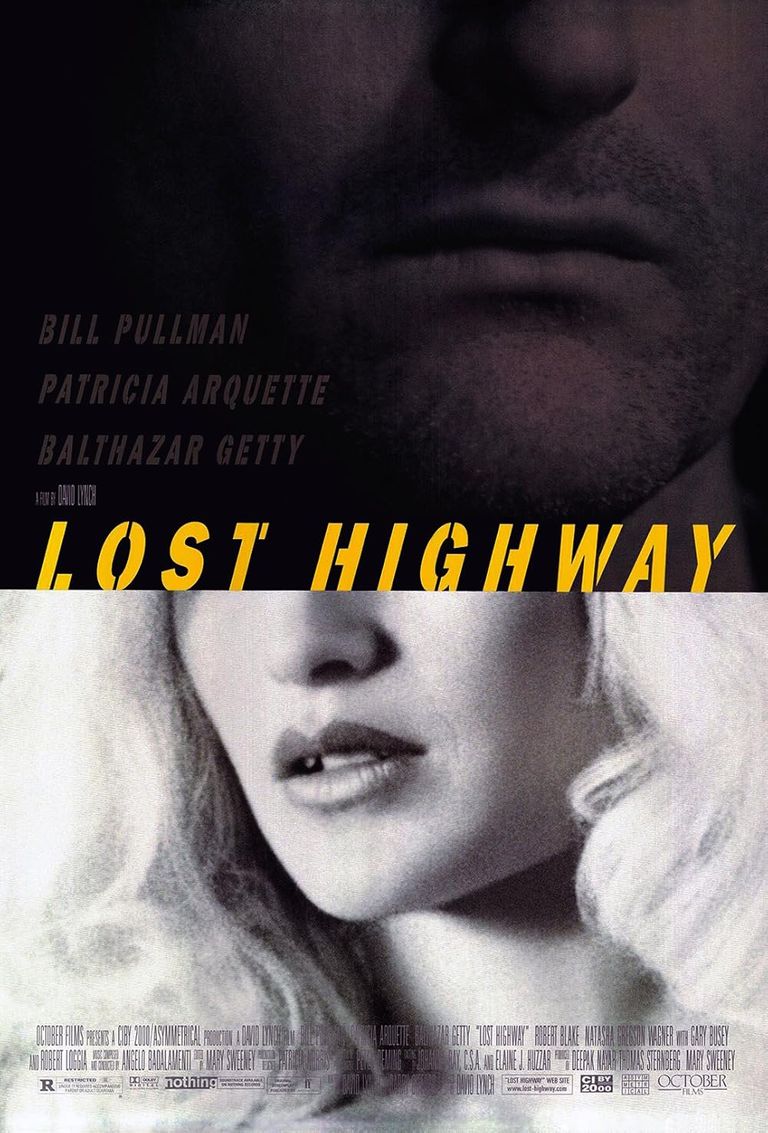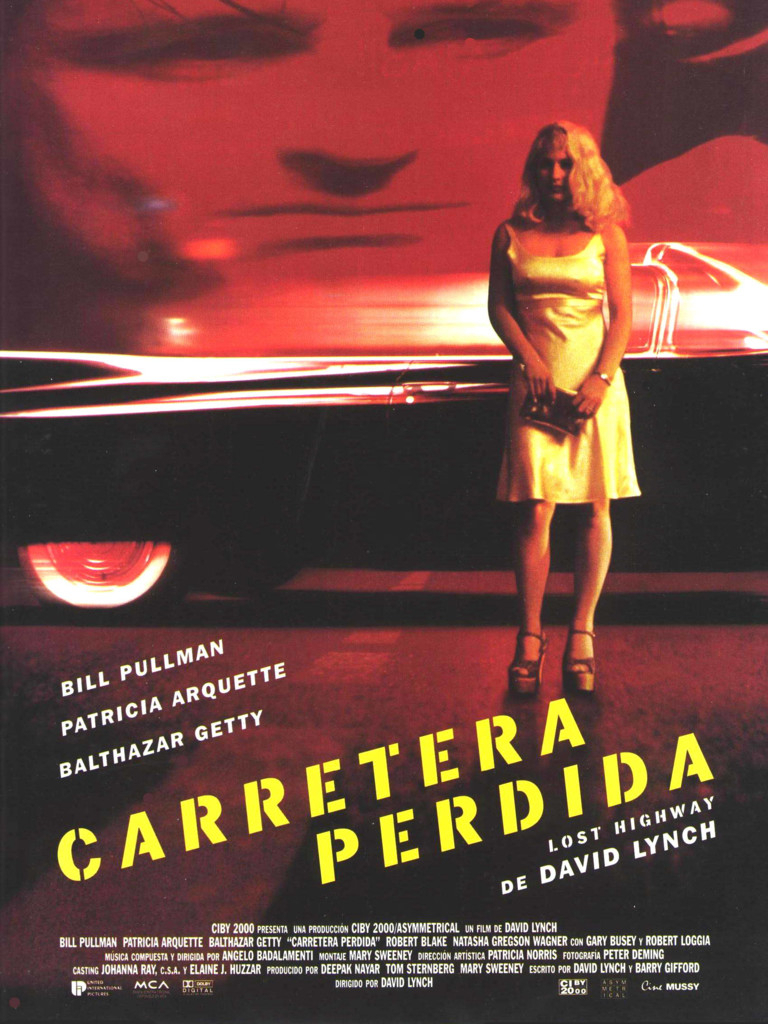
Lost Highway is a 1997 film directed by David Lynch. It is a crime story, which can be considered an example of modern film noir, but with surreal imagery and themes. Lynch wrote the screenplay together with Barry Gifford; the original soundtrack is composed by Angelo Badalamenti and David Lynch.

Fred Madison answers the intercom at his home and hears the words ‘Dick Laurent is dead’ - Fred's reaction shows that this mysterious message does not seem to be telling him anything. Fred is a jazz musician who suspects his wife Renee of infidelity. The couple share a strained relationship that brings Fred close to a mental breakdown.
One morning the Madisons find a package outside their house. Inside is a videotape showing a shot of the outside of the house. The tape ends by showing their front door. Dismissing the tape as ‘an advertisement from some estate agent’, the couple find a second one the next day. This video is longer than the first and shows the camera entering the Madison's living room, and then their bedroom, where Fred and Renee are filmed sleeping.
The police are unable to solve the mystery; there are no forced locks in the house. The same evening Renee takes Fred to a party at Andy's house, with whom it seems obvious Renee is having a sexual relationship. While Renee is having fun with Andy, Fred meets a man, later identified only as Mystery Man - an individual with strange pale skin who starts an extremely cryptic conversation with Fred (who has seen the man's face before in a hallucination). The Mystery Man asks Fred to call his house, to prove to him that he is there at the same time as he is facing him. Fred makes the call and before he can ask him how it is possible for him to be in two different places and how he got into his house, the Mystery Man leaves.
Shocked by what is happening, Fred takes Renee home to check on her. The house, which by day appears to be an architectural masterpiece of corridors and slanted walls, becomes distressing and dark at night. Fred enters a dark corridor, walks down it and disappears.
The next morning, Fred finds another videotape outside his house. It looks identical to the last one he received, but the footage shows the camera entering the bedroom, Fred is filmed on the floor next to Renee's dismembered body, Fred does not understand what is happening and finds himself in a police station where a detective is beating him, calling him a murderer.
Fred is imprisoned for the murder of Renee, which he does not remember committing. In prison he suffers from terrible headaches and begins to collapse. During one of his sleepless nights, Fred suffers a strange seizure and by the next morning has ‘transformed’ into a young man named Pete Dayton. The police are stunned, shocked and unsure how Fred Madison escaped from a maximum security prison and how Pete Dayton ended up in his cell. Since Pete has committed no crime, he is released and returns home to his parents - despite a police patrol constantly following him.
Pete returns to the garage where he works as a mechanic, and where we discover he is the favourite mechanic of Mr Eddy, a local gangster. One of the policemen shadowing Pete recognises Mr Eddy by another name - Dick Laurent.
Laurent returns to the garage in the evening with the beautiful Alice, whom Pete notices immediately. She returns later that same night, alone, and the two start dating.
It is obvious that Pete is suffering from a similar psychological stress to that which had afflicted Fred; he has no recollection of the incident that landed him in prison (unlike his parents, who refuse to tell him about it), he is cheating on his fiancée (who is leaving him) and Laurent has violently manifested that he suspects something between him and Alice. Alice reveals to Pete that she is involved in pornography because of Laurent, and organises a plan with Pete to escape and escape Laurent's revenge. The plan involves attacking Andy, already Renee's friend at the beginning of the film, robbing him, and finally selling the loot to a fence friend of Alice's, thus obtaining the money to start their life together.
After receiving a murderous intimidation from Laurent over the phone - which includes a brief disturbing monologue by the Mystery Man - Pete goes to Andy's flat as arranged, contrary to plan however during the scuffle with Andy the latter is killed. So Pete escapes with Alice with the loot (not before he suffers terrible visions in which Alice betrays him).

Bill Pullman: Fred Madison
Patricia Arquette: Renée Madison / Alice Wakefield
Balthazar Getty: Peter Raymond Dayton
Robert Loggia: sig. Eddy / Dick Laurent
Natasha Gregson Wagner: Sheila
Gary Busey: Bill Dayton
Lucy Butler: Candace Dayton
Jack Nance: Phil
Richard Pryor: Arnie
Michael Massee: Andy

That Lynch is now a genius of contemporary cinema is indisputable; and it is also true that his films continue to divide critics and audiences more and more, as happened with "Lost Highways" itself: is it a mere intellectual game on Lynch's part (he is taking the piss, some say) or are his films true masterpieces?
In my opinion, Lynch's films deserve all the attention possible because a Lynch film is a cinematic experience that is difficult to find in today's cinema. Dark and gloomy stories, convoluted plots, continuous alternation between dream and reality: these are, in a few words, the typical elements of our director, and those who have managed to understand something of the stories in his films are, without a doubt, worthy of praise. But are we sure that this is what is important? Are we sure that it is extremely necessary to search for a meaning and an explanation for his films?
I think not. A film like "Lost Highways" should not be explained, but experienced in all its intensity. Lynch's films are fascinating visual experiences, which undoubtedly leave a mark; David deliberately mixes the cards in each of his works, makes us lose the thread of the story, takes us to worlds where nothing is comprehensible anymore: then we find ourselves lost, at the mercy of the images, lost in the mental constructions of the characters, and we like to let ourselves be carried away by the music, by the images, even if we no longer understand anything now we are captured and we follow with the protagonists those crazy lost roads that probably lead nowhere.
At the end, the credits appear and we are shocked, because we thought that in the end everything was explained, but it is not so; and yet we are not shocked, because what we have just experienced is true cinema, the cinema that with the power of the image snatches us from our world and catapults us into another world, where each image is a discovery, where each sequence is pure emotion. Lost Highways fully confirms this rule, presenting itself as a film that is completely out of the norm, a film that is in some ways totally crazy, but in which it is damned nice to get lost.
For Lynch, the story plays an absolutely secondary role, it is a mere pretext; Lynch does not like stories, Lynch loves cinema. And behind all this, however, Lynch builds something on which the film rests, a perfect plot that if uncovered reveals even more of its originality.
But, as I said, it is not essential to discover it. 'Lost Highways' is David Lynch's penultimate film, made in 1996, three years before his absolute masterpiece, 'A True Story', a film about which one can say anything but that it is a Lynchian film; and it is knowing that he managed to make a film so extraordinarily different from his previous films that we can confirm the immense skill of the master David; a film that is the opposite of 'Lost Highways', where there is only one road, and it is traveled by an old man on a slow lawnmower; It is a film in which, leaving aside intricate plots and cursed characters, Lynch brings poetry and the immense power of the image to the screen; a masterpiece, in short.
Two years later he would make another beautiful film, but returning to his old style: 'Mulholland Drive'. Many consider 'Lost Highways' a previous exercise to 'Mulholland', and perhaps that is so. In fact, 'Lost Highways' is slightly inferior to the latter, perhaps because it did not manage to completely detach itself from reality, and at certain moments it maintained the style of the traditional thriller, leading the spectator to a continuous search for the truth and perhaps without getting him completely lost in the twists and turns of the film. In 'Mulholland Drive', on the other hand, one can no longer hold on to anything, because the dream has become reality, reality has become a dream and the spectator sees how the characters continually cross the screen without knowing what they do and why they do it. A dream, a nightmare, a magnificent journey.


Carretera Perdida es una película de 1997 dirigida por David Lynch. Es una historia policíaca que puede considerarse un ejemplo del cine negro moderno, pero con imágenes y temas surrealistas. Lynch escribió el guión junto con Barry Gifford; la banda sonora original está compuesta por Angelo Badalamenti y David Lynch.

Fred Madison responde al interfono de su casa y escucha las palabras «Dick Laurent ha muerto». La reacción de Fred demuestra que este misterioso mensaje no parece decirle nada. Fred es un músico de jazz que sospecha de la infidelidad de su esposa Renee. La pareja comparte una tensa relación que lleva a Fred al borde de un colapso mental.
Una mañana, los Madison encuentran un paquete en la puerta de su casa. Dentro hay una cinta de vídeo en la que se ve el exterior de la casa. La cinta termina mostrando la puerta principal. Tras descartar la cinta como «un anuncio de alguna agencia inmobiliaria», la pareja encuentra una segunda al día siguiente. Este vídeo es más largo que el primero y muestra a la cámara entrando en el salón de los Madison, y luego en su dormitorio, donde Fred y Renee aparecen durmiendo.
La policía es incapaz de resolver el misterio; no hay cerraduras forzadas en la casa. Esa misma noche, Renee lleva a Fred a una fiesta en casa de Andy, con quien parece evidente que Renee mantiene una relación sexual. Mientras Renee se divierte con Andy, Fred conoce a un hombre, más tarde identificado sólo como Hombre Misterioso - un individuo de extraña piel pálida que inicia una conversación extremadamente críptica con Fred (que ha visto la cara del hombre antes en una alucinación). El Hombre Misterioso le pide a Fred que llame a su casa, para demostrarle que está allí al mismo tiempo que se enfrenta a él. Fred hace la llamada y antes de que pueda preguntarle cómo es posible que esté en dos lugares diferentes y cómo entró en su casa, el Hombre Misterioso se marcha.
Conmocionado por lo que está ocurriendo, Fred lleva a Renee a su casa para ver cómo está. La casa, que de día parece una obra maestra arquitectónica de pasillos y paredes inclinadas, se vuelve angustiosa y oscura por la noche. Fred entra en un pasillo oscuro, lo recorre y desaparece.
A la mañana siguiente, Fred encuentra otra cinta de vídeo fuera de su casa. Parece idéntica a la última que recibió, pero la grabación muestra a la cámara entrando en el dormitorio, Fred es filmado en el suelo junto al cuerpo descuartizado de Renee, Fred no entiende lo que está pasando y se encuentra en una comisaría de policía donde un detective le está pegando, llamándole asesino.
Fred es encarcelado por el asesinato de Renee, que no recuerda haber cometido. En la cárcel sufre terribles dolores de cabeza y empieza a desmayarse. Durante una de sus noches de insomnio, Fred sufre un extraño ataque y a la mañana siguiente se ha «transformado» en un joven llamado Pete Dayton. La policía está atónita, conmocionada e insegura de cómo Fred Madison escapó de una prisión de máxima seguridad y cómo Pete Dayton acabó en su celda. Como Pete no ha cometido ningún delito, es puesto en libertad y regresa a casa de sus padres, a pesar de que una patrulla de policía le sigue constantemente.
Pete regresa al taller donde trabaja como mecánico, y donde descubrimos que es el mecánico favorito del Sr. Eddy, un gángster local. Uno de los policías que siguen a Pete reconoce al Sr. Eddy por otro nombre: Dick Laurent.
Laurent vuelve al garaje por la noche con la bella Alice, en quien Pete se fija inmediatamente. Ella vuelve más tarde esa misma noche, sola, y los dos empiezan a salir.
Es obvio que Pete sufre un estrés psicológico similar al que había afligido a Fred; no recuerda el incidente que le llevó a la cárcel (a diferencia de sus padres, que se niegan a contárselo), está engañando a su prometida (que le abandona) y Laurent ha manifestado violentamente que sospecha que hay algo entre él y Alice. Alice revela a Pete que se dedica a la pornografía por culpa de Laurent, y organiza un plan con Pete para escapar y evitar la venganza de Laurent. El plan consiste en atacar a Andy, ya amigo de Renee al principio de la película, robarle y, finalmente, vender el botín a un perista amigo de Alice, obteniendo así el dinero para empezar su vida juntos.
Tras recibir una intimidación asesina de Laurent por teléfono -que incluye un breve monólogo perturbador del Hombre Misterioso- Pete acude al piso de Andy tal y como habían acordado, sin embargo, contrariamente a lo previsto, durante la refriega con Andy éste resulta muerto. Entonces Pete escapa con Alice con el botín (no sin antes sufrir terribles visiones en las que Alice le traiciona).

Bill Pullman: Fred Madison
Patricia Arquette: Renée Madison / Alice Wakefield
Balthazar Getty: Peter Raymond Dayton
Robert Loggia: sig. Eddy / Dick Laurent
Natasha Gregson Wagner: Sheila
Gary Busey: Bill Dayton
Lucy Butler: Candace Dayton
Jack Nance: Phil
Richard Pryor: Arnie
Michael Massee: Andy

Que Lynch es a estas alturas un genio del cine contemporáneo es indiscutible; y también lo es que sus películas siguen dividiendo a crítica y público cada vez, como ocurrió con la propia «Carreteras perdidas»: ¿se trata de un mero juego intelectual por parte de Lynch (nos está tomando el pelo, dicen algunos) o son sus películas verdaderas obras maestras?
En mi opinión, las películas de Lynch merecen toda la atención posible porque una película de Lynch es una experiencia cinematográfica difícil de encontrar en el cine actual. Historias oscuras y tenebrosas, tramas rebuscadas, alternancia continua de sueño y realidad: estos son, en pocas palabras, los elementos típicos de nuestro director, y aquellos que han conseguido entender algo de las historias de sus películas son, sin duda, dignos de elogio. Pero ¿estamos seguros de que esto es lo importante? ¿Estamos seguros de que es extremadamente necesario buscar un sentido y una explicación a sus películas?
Yo creo que no. Una película como «Carreteras perdidas» no debe explicarse, sino experimentarse en toda su intensidad. Las películas de Lynch son experiencias visuales fascinantes, que sin duda dejan huella; David mezcla deliberadamente las cartas en cada una de sus obras, nos hace perder el hilo de la historia, nos lleva a mundos donde ya nada es comprensible: entonces nos encontramos perdidos, a merced de las imágenes, perdidos en las construcciones mentales de los personajes, y nos gusta dejarnos llevar por la música, por las imágenes, aunque ya no entendamos nada ahora estamos capturados y seguimos con los protagonistas esas locas carreteras perdidas que probablemente no llevan a ninguna parte.
Al final, aparecen los títulos de crédito y nos escandalizamos, porque pensábamos que al final todo estaba explicado, pero no es así; y sin embargo no nos escandalizamos, porque lo que acabamos de vivir es cine de verdad, el cine que con el poder de la imagen nos arrebata de nuestro mundo y nos catapulta a otro mundo, donde cada imagen es un descubrimiento, donde cada secuencia es pura emoción. Carreteras perdidas» confirma plenamente esta regla, presentándose como una película totalmente fuera de la norma, una película en cierto modo totalmente loca, pero en la que es condenadamente agradable perderse.
La historia para Lynch juega un papel absolutamente secundario, es un mero pretexto; a Lynch no le gustan las historias, Lynch ama el cine. Y detrás de todo ello, sin embargo, Lynch construye algo sobre lo que descansa la película, una trama perfecta que si se destapa revela aún más su originalidad.
Pero, como decía, no es imprescindible descubrirlo. 'Carreteras perdidas' es la antepenúltima película de David Lynch, realizada en 1996, tres años antes de su obra maestra absoluta, 'Una historia verdadera', una película de la que se puede decir todo menos que es una película lynchiana; y es sabiendo que consiguió hacer una película tan extraordinariamente diferente a sus películas anteriores como podemos confirmar la inmensa habilidad del maestro David; una película que es lo contrario de «Carreteras perdidas», donde sólo hay una carretera, y la recorre un anciano en un lento cortacésped; es una película en la que, dejando a un lado intrincadas tramas y personajes malditos, Lynch lleva a la pantalla la poesía y el inmenso poder de la imagen; una obra maestra, en definitiva.
Dos años más tarde realizaría otra hermosa película, pero volviendo a su viejo estilo: 'Mulholland drive'. Muchos consideran 'Carreteras perdidas' un ejercicio previo a 'Mulholland', y quizá sea así. De hecho, 'Carreteras perdidas' es ligeramente inferior a esta última, quizá porque no conseguía desligarse totalmente de la realidad, y en ciertos momentos mantenía el estilo del thriller tradicional, llevando al espectador a una continua búsqueda de la verdad y quizá sin conseguir que se perdiera del todo en los meandros de la película. En 'Mulholland drive', en cambio, uno ya no puede aferrarse a nada, porque el sueño se ha convertido en realidad, la realidad se ha convertido en sueño y el espectador ve cómo los personajes cruzan continuamente la pantalla sin saber qué hacen y por qué lo hacen. Un sueño, una pesadilla, un viaje magnífico.
Source images / Fuente imágenes: IMDB.


Sources consulted (my property) for the preparation of this article. Some paragraphs may be reproduced textually.
Fuentes consultadas (de mi propiedad) para la elaboración del presente artículo. Algunos párrafos pueden estar reproducidos textualmente.
| Argentina Discovery. |  |
|---|---|
| Galería Fotográfica de Argentina. |  |
| Viaggio in Argentina. |  |
| Patagonia Express. |  |

La Casa de las Dagas Voladoras, una obra maestra, majestuosa y opulenta, todo un espectáculo de belleza y ritmo.
Source images / Fuente imágenes: IMDB.


Sources consulted (my property) for the preparation of this article. Some paragraphs may be reproduced textually.
Fuentes consultadas (de mi propiedad) para la elaboración del presente artículo. Algunos párrafos pueden estar reproducidos textualmente.
| Argentina Discovery. |  |
|---|---|
| Galería Fotográfica de Argentina. |  |
| Viaggio in Argentina. |  |
| Patagonia Express. |  |

La Casa de las Dagas Voladoras, una obra maestra, majestuosa y opulenta, todo un espectáculo de belleza y ritmo.
Source images / Fuente imágenes: IMDB.


Sources consulted (my property) for the preparation of this article. Some paragraphs may be reproduced textually.
Fuentes consultadas (de mi propiedad) para la elaboración del presente artículo. Algunos párrafos pueden estar reproducidos textualmente.
| Argentina Discovery. |  |
|---|---|
| Galería Fotográfica de Argentina. |  |
| Viaggio in Argentina. |  |
| Patagonia Express. |  |
